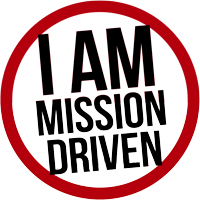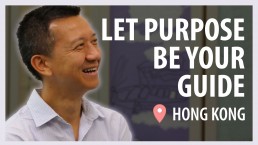Dream Big, but Act Small - Francis Ngai, SvHK
In this episode of Entrepreneurs For Good, I speak with Francis Ngai about the work he is doing to build community centers in some of Hong Kong's most vulnerable areas.
Work that is difficult, but as he says more than once, while you need to have big dreams, you need to be focused on taking small steps.
It is a fantastic conversation about approaching big challenges, the role of purpose, and maintaining continued momentum through small steps.
It's important that you keep on dreaming. Dream Big, but Act Small.
About the Entrepreneurs For Good Series
Through this series, we speak with Asia based entrepreneurs whose mission it is to bring solutions to the environmental, social, and economic challenges that are faced within the region to learn more about their vision, the opportunities they see, and challenges that they have had to overcome.
It is a series that we hope will not only engage and inspire you, but catalyze you and your organizations into action. To identify a challenge that is tangible, and build a business model (profit or non) that brings a solution to the market.
About Francis Ngai
Francis Ngai is the Founder and Chief Executive Officer of SVhk. He is the Co-Founder of Green Monday, Playtao Education and RunOurCity.
Francis believes that everyone can be a changemaker. Seeing ‘ME’ as the reflection of ‘WE’, he hopes to bring together more people to re-imagine our city and pursue big dreams to make a difference to the community we live in.
Prior to establishing SVhk, Francis was the Head of Strategy in a listed technology conglomerate in Hong Kong. He graduated from the City University of Hong Kong and was conferred as an Honorary Fellow by the University in 2013. He was selected as one of the 100 Asia Pioneers by The Purpose Economy in 2014, a Young Global Leader of the World Economic Forum in 2012 and one of Hong Kong’s Ten Outstanding Young Persons in 2011.
As an ultra-running veteran, Francis completed The North Pole Marathon in 2013 and the 250-km Gobi March of the 4 Deserts race series in 2012.
Follow Francis and SVhk:
Website: http://sv-hk.org
Facebook: https://www.facebook.com/francis.ngai.90
LinkedIn: https://hk.linkedin.com/in/francis-ngai-87915831
Wikipedia: https://en.wikipedia.org/wiki/Francis_Ngai
Youtube: https://www.youtube.com/user/socialventureshk
About Rich
Driven by the belief that change begins with a single step, Richard Brubaker has spent the last 15 years in Asia working to engage, inspire, and equip those around him to take their first step. Acting as a catalyst to driving sustainability, Brubaker works with government, corporate, academic and non-profit stakeholders to bring together knowledge, teams, and tools that develop and execute their business case for sustainability.
Follow Rich
Website: http://www.richbrubaker.com
Facebook: https://www.facebook.com/rich.brubaker
LinkedIn: https://www.linkedin.com/in/richbrubaker
Snapchat: http://snapchat.com/add/richbrubaker
Instagram: https://instagram.com/richbrubaker
Twitter: http://www.twitter.com/richbrubaker
Contact Rich
[email protected]
Full Interview Transcript
Welcome back everyone. Thank you for you very much for joining. I am here with Francis Ngai who has worked in across the spectrum of issues in Hong Kong, Very inspirational. We're talking about how your children drive you to change. To the future of millennial purpose. Then how to bring business skills to the social sector for impact. So we hope you'll enjoy this. If you do, please remember to like, comment and share.
BACKGROUND
RICH: Francis, thank you very much for taking the time to meet with us. Please do here and maybe introduce yourself and the work that you are doing here at SVHK.
FRANCIS: I am Francis from Social Ventures Hong Kong. I founded the organization since 2007. So we are practicing that philanthropy. We invest, incubate and invent social innovation in Hong Kong.
VENTURE PHILANTROPY
RICH: What is venture philanthropy? What does the impact investment?
FRANCIS: I think those are some terminologies that can explain more briefly. I think overall to access things like an applications of all good resources in the community So come capital owners they don't they prefer not just writing check. They want to participate more. I use them, their networking expertise, professional volunteers. So people with good ideas...social entrepreneurs or corporate. We try to reshuffle all these resources coming together. So we threw ourselves to always to be an applicative.
GETTING STARTED
RICH: So how did you start SVHK? Like what was your background? Why get into the venture philanthropy area when you probably had another business you were working on?
FRANCIS: I start with business, around 15 years of business or experience. Having two kids and I quit my job. So probably a lot of self interest I think to my kids future wealth. So I think that and current world is not that good. Also I think we are not using enough idea to work it out. I think we have a lot of resources in the community impacting. We will always just prefer to wait for the government to happen. I think obviously original idea that we try to do something else.
CATALYST FOR CHANGE
RICH: I know when you have children, everything changes. So, what were the major concerns you had about the world that you were like you're looking at your kids, oh my god I don't' know what I'm going to do?
FRANCIS: After having kids, you reflect. So what is the current role? What is the society? You read about some education brings about how to see some, but I think at the end of the day I think that it's how you are doing is influencing their future. So I'm asking myself, what is the most important thing to teach them. I think at the same time I am asking myself whether I'm dreaming or not. Maybe not. I'm helping some rich people to fulfill their dream, which I don't think hopefully can agree with that dream. It's just profit sometimes over purpose. So how can we turn it around? Around society we see that we're not talking about purpose.
RICH: I struggle with this. I really view business as a medium to, I wont say find purpose, but to deliver purpose. At the end of the day, what you have here is a community center. People will say, oh it's a non-profit, but it's still a business. You still have rent, you still have staff, you still have P&L, you have everything. The question is what do you do at the end of the year. When you started this, when you started getting into this, obviously you probably had a very different view of what venture philantropy or whatever. Like social entrepreneurship, whatever that it might have been. How did you start like, kind of starry-eyed, and then what do you feel now after you six to ten years of being in this space?
FRANCIS: I would say at first is static bubble that we shuffle around a lot of all that seeing philanthropy. How social investing is doing things. Just trying to form that kind of entity to do things. I think in the long journey we discovery more. I think could be summarized as the purpose. I think at first I think we all remember that. When we're doing business in doing something in the world, even non profit, they got a purpose. But ultimately we become more resources driven. We just see something that into more rich as KIPs and then we lost something else.
RICH: Now when you go back...actually I'm going to take you back a little...you talk about when you started in business. Like I started in business and was like, I'm going to change the world. I'm going to do this and this and I'm going to grow and I'm gonna grown and that's like my goal. Then you get a little bit more, practical. You start going wow, I have bills to pay, I have staff to feed. You become very practical. You don't loose your dream. You don't loose your purpose, but you definitely get into the business and it becomes a very different thing.
I found the same thing for social innovation as well. I'm' going to save the world. I'm going to help these children. I'm going to educate the elderly, whatever it may be. But then you get into the business side of things. How has your own perspective changed from really kind of idealistic into the practical? What are the practicalities now that you didn't think you had before?
FRANCIS: So I think at first I think we started off with do engine thinking. So I think social enterprise is all about social business. So we didn't think that what was one thing was more important than the other. So when we find the purpose, the social side how was the problem that we were are more cared about. I think that's it. So after that, I think we had a whole attitude on the business side. We have to make it sustainable. Make it work. Make it a public so everyone gets to know it.
So I think how do you keep the balance is not easy, but I think always and still in 10 years of journey, one thing is important, keep on dreaming. Dream big, but act small. So we hold up to with persistence on every thing we are working on. But every day we still try to think about fine tuning our model. Because we find that if we lost that dream that could keep us forever, we lost the momentum. So I think that also feeling feed back along is the passion. Where's the passion coming from? So every day I think still we are asking ourselves in the morning, why we are coming into office again today. I think that is the most important question. If we have that, we will keep on dreaming. We don't mind the niddy gritty things. We don't mind the hard work. I think if we lost it, we're done.
STAYING FOCUSED
RICH: You have a lot of different issues. You have Diamond Cab, that is kind of challenge access - wheelchair access. You have Green Monday, Meet. Is it a problem that you're all over the place? Or do you think that it would be better if you were focused on one issue? Is it part it....because you have to maintain your passion you have to move things around? Or is it that the best way you think you can get things done?
FRANCIS: Definitely a challenge on my team especially. Ten meetings in a day. In the morning you're talking about kids. But the other meetings talking about elderly. Then we move onto the climate change. So we keep on shifting. I think that is exactly our role. We don't need to be under the spotlight. Someone has to do it.
FUNDING MODEL
RICH: So you're basically investing into other entrepreneurs and their ideas and then you also start your own. Where does your funding come from?
FRANCIS: I think first the two or three of years it was my own resources, time, days, nights, kids, etc. But I think later we got some philanthropy money coming in. So I think all along I think partially we are relying on these resources to build that up because they are committed in incubating more social innovations in Hong Kong. So we are using that resources. But I think in long journey we also be our own income through some program, some incubation program. For the deals we don't ride on primarily on the profit. So I think it's not the short time we can get any repayment. I think whatever we get back, we just put back in the fund.
RICH: So are you making equity investments then? Or do you prefer debt or is it grants? Like what's your median?
FRANCIS: Mostly equity.
RICH: Ok.
FRANCIS: Grant money would say that a lot of foundations would like to do more new things now. So when we, whatever we get these we go approach them. So we invest very little in the very early stage. So if you're sustain on the prototype stage. But after that, we try to find true investment even in equity as well. But we have to be bigger equity stakeholders some times because we need to have a safe interactions, great for sure. Invest in more.
MAINTAINING FOCUS
RICH: Actually you mentioned something I kind of struggle with. They're always looking for something new. For me, the problems never really change. So how hard is it for you to focus albeit the entrepreneurs, the donors funders on just getting the current work done? Like how do you manage that?
FRANCIS: It's difficult. I think more philosophically sometimes we follow the flow. So we're seeing that one entrepreneur seeing that problem Something that we always keep in mind is that apart from the direct impact, which is confined to the scope within the entity, we always see the impact of that. The rippling effect. How that have the implications from policymakers. How with that them with an implications to the other industry people. Like Diamond Cab, there are two cabs. We get ourselves sustainable, and then another taxi licenses only. But end of conflict, 80 cabs. So like being affordable housing model, right now a couple different NGO's replicating it. Even in the media they call it...
RICH: That's okay right?
FRANCIS: That's what, that's how. So what we see right now at the juncture of ten years, we are shaping our 10 year plan. We are seeing a long journey, if we talk bout housing we talk about poverty. What kind of partners we need in that cab. Not all the things we need to invest ourselves. But we coordinated as one cabs. We need Avengers instead of Iron Man.
RICH: But what fuels your continued dreaming? You start off you're really passionate, you meet the challenge, but you are still executing it on a daily basis. What has been your impact so far that you look back and go I feel really proud about this? Then, do you still look in your kids eyes and go I still have a lot of work to do?
FRANCIS: I still do a lot. I think that learning from the journey whether change system or change mindsets. So like the interview today. I think using the small works that we have, how can we spread it out? Changing more minds is so important. I think maybe the ultimate goal is changing more mindsets. So I don't see that we need more people quit their job to be social entrepreneur is hard. So why we're working on business 2.0 or something else.
I think there are a lot of entrepreneurs can work together. So we're definitely in the world I think the society we're migrating from 1.0 to 2.0. If 1.0 is more resources drive in, 2.0 is more about a shared mindset, more value driven.
RICH: But do you see that happening? Are people more shared mindset now? Or are they getting more...cuz we have so much challenges of where we're all pulling back from each other. Is it...
FRANCIS: Main streamers do not. But I think all the movement start with quite a few city people like us. So I think we if we don't work it now, 10 years later when my kids are really grown up they will not see it. But I would say that at least the biggest gain that I have in the last 10 years...also feeling all my passion as the people that we see. I suspect that the mayor all the people got some good DNA in them. It's just that we don't have innovated enough to think about some platform for them to come up.
RICH: Well, and what the way to catalyze that? Like, how do you tap into that hidden gene or into that thing that's just sleeping for right now? How do you drive it? Like what does it take?
FRANCIS: Baby step. Green Monday. We are now asking people to be full time with charity. Although it made more sense for one individual for their health and things. I myself am a vegetarian, but I think we just take one day. Just start with one meal. By the way it's a beyond burger. It's delicious. Its fulfilling. So after that, we talk about you create an image. Use marketing.
If a marketing company can get someone to buy a bag, which is manufactured in Shenzhen, but paying several tens of thousands of dollars. How can I...can we use the same thing to your fake people to get them on board to try on hew things first? But after 10, you tell them oh by the way you're saving the planet now. All of them will become entrepreneur. They will internalize what the good habits. So I think these kinds of things is what we're learning now.
But I think all the more we start with small. Start with something small. After the engagement, they become part of the adventure too. That's more important.
RICH: Okay. Kind of going back to your marketing. What are the tools that you found most reliable. Like from your old days in marketing, what do you go back to every day in the office...yeah, this is what I used to do for this client? We can use that here. Like are there some standards tools that you've continued using.
FRANCIS: I think not very formal. I think at the end of the day I think it's more result of thing But I think one thing that we use a lot when I am at the time of them, in the business world, I also discovered one new trend that I invented some model is on the collateral collaborative marketing tracking. Collaborative strategies so that we always apply. Basically these partnerships. Especially social entrepreneur, I highly encourage you to try build more leverage.
In the past hierarchical world, you find resources, feeling somewhat intermediary finance and partners and paying them and it worked a lot. I think not now. We're all in a circular positions. Then we come out in the middle where the value people came around. There's no high and low. We don't back for resources. They just come. They're fulfilling their own self resources and self interest. So I think we all fulfill thinking about the mutual benefits. We got corporate, they're funding it through charity anyway. But I think it's good for your brand.
We work on something that they don't demand for even. But for some company, people can come in here, they're just get a service. I don't know we take them through to empower them later. I think it's kind of more...think about neutral. So everyone we collaborate, we think about what is their benefit first.
RICH: What are the resources do you think that we're missing right now in the social space? Like if there's things that you could attract business people of any stripe or something else. It could be government, any other like what do you think that we're missing? What do you think that could take our challenges and solutions to scale?
FRANCIS: If there is one thing you want me to mention, I would say we have need to encourage more links. We need to build more links. So I think we are not having innovative platform enough to aggregate resources. So ticks around.
So I think for example, Green Monday. I take that example that we can both understand more clearly. So I think when we work with some caterers and we think about ways for them to participate. So when we work with some food manufacturers, we think about some of the waste. So if you create more different vehicles, so that could help them to come in, come on board much easier.
So for fund raisers, even. I would say talk to some vendors. If your funding directly on the impact or _______ (16:07) social enterprises, we can choose to fund the links. How can you encourage them to work more with the corporate.
So for some early pilot in some innovative, I always called them infrastructure innovation. So when you need to invest into innovation infrastructures because right now we're at the juncture of migrating to a new world, if there's an new world. But if I think if we do not have enough links, we cannot carry over all resources for people to come on board. That's so much important.
TALKING TO DONORS
RICH: I was wondering....people really don't want to invest in the infrastructure though. They want to invest in the shiny building, not in the pipes, the wiring. Ya know, they don't' want to invest in research. They want to invest in the program that has no research. Like they want to fund the idea, not the amount. So how do you, I mean, because you come from the business world, because you have your own resources, is that where you spend...you build the foundations and you don't have to worry about what the donors want?
FRANCIS: We definitely get better language to talk to them. We know people, but I think most important thing is it makes sense for them. So I think it's around, I will say that. The most important thing is the kids. How can you illustrate that with them. Like especially we imagine a lot and infrastructures.
We need to go back to the funding and educate them and share with them. Tell them if that works perfectly. So I think without case, it's all empty talks. By the way I would say that younger generations for some big families they're changing the mindset. They don't believe in the name on the building anymore. They are migrating into a new generations. Within 10 years, I would say a lot of the younger generations would take over.
RICH: I think that's actually how we met. Through the family business network. Probably I think way back when way back when because I spoke with you at Bernie's event. So actually that kind of brings a really interesting point. Like the next generation of Hong Kong. Hong Kong is a city run by families, largely. At least in the business world. As you mentioned a lot of the names on buildings. Albeit the business school or the different buildings that they own.
THE NEXT GEN
RICH: Five, ten years ago the second gen was either trying to leave the family business, but now they are trying to come back. I know a few people are coming back. Like what are they doing? Why would they want to change now? What do you seeing that makes them want to change the family business?
FRANCIS: I would say no matter what is their background, they are all citizens of Hong Kong. They are all people involved. So I would say the millennials especially, when they grown up, they have a lot of education on a sustainable world. On how to be build a better society, it's in their blood.
So I also think they are documented entrepreneur. They're not that resources driving. They're not that profit driven. They see more differently. In terms of wealth, I think they would think that I'm ok for the next, next six generations. So ....That number is just a number in the game. So I think for them, the more fulfilling thing is while they are doing their own business or doing their own land. They want to see the real impact.
So I think its shifting, but again I would say that we need more infrastructure. More different ways. Sometimes more cool way when we talked about charity of philanthropy, sometimes its way too old fashioned. So we need to move on as well.
RICH: Thank you very much for your time. You have a line of kids lined up outside. I don't want to hold them out! They're like I want to color. Thank you very much for your time. Very inspiring.
For more interviews from the "Entrepreneurs for Good" series, check out the playlist here.
Stay tuned for more clips and full interviews in the coming weeks.
Developing and Scaling Sustainable Tech in China
With the size of economic, social and environmental challenges growing at a scale and scope that can shatter limits set by global governments, Mother Nature and society, sustainable tech will become the gauge by which we analyze resource levels, measure system performance, identify efficiencies, curb consumption and influence stakeholders to make better decisions.
We are already seeing the results in a number of areas, and the gains made by streamlining our lifestyles and systems to increase efficiency is a win-win for both individuals and the environment around us.
Food & Agriculture
Over the past 30 years, China has experienced rapid levels of urbanization and its citizens have become richer. But the trade-off has been depletion in arable land while structural inefficiencies in the food value chain have made it difficult to provide safe, accessible and affordable food to the market.
With available arable land diminishing and what little there is of it increasingly over utilized, one solution that can boost production in order to meet demand is aquaculture and hydroponic systems . Alesca Life Technology is an example of a firm taking the next step forward, through the adaptive re-use of shipping containers where food can be grown within the proximity of urban centers. Another example is Oceanethix, whose urban aquaculture process can turn any warehouse or retail center into a highly productive, environmentally clean, and transparent fish farm.
As China lurches from one food safety scandal to another, it is clear that consumer confidence has deteriorated and changes are being demanded to improve and introduce sustainable practice. Using smartphone applications and online solutions, consumers can now easily scan and receive information regarding products’ life cycles. Shenzhen Vanch and IBM group are among those who have invested in traceability systems in China, a lucrative business opportunity that also gives consumers peace of mind.
There is also tech progress being made at other steps along the supply chain . For example, the introduction of drones that leverage advanced sensors, low-cost aerial camera platforms and autopilot capabilities can give farmers the ability to view their crops from above, detect and assess irrigation issues, pest infestations, plant health and provide soil analysis. Tech products provided by companies such as DJI innovations and Ehang are now being used by hundreds of farms across China.
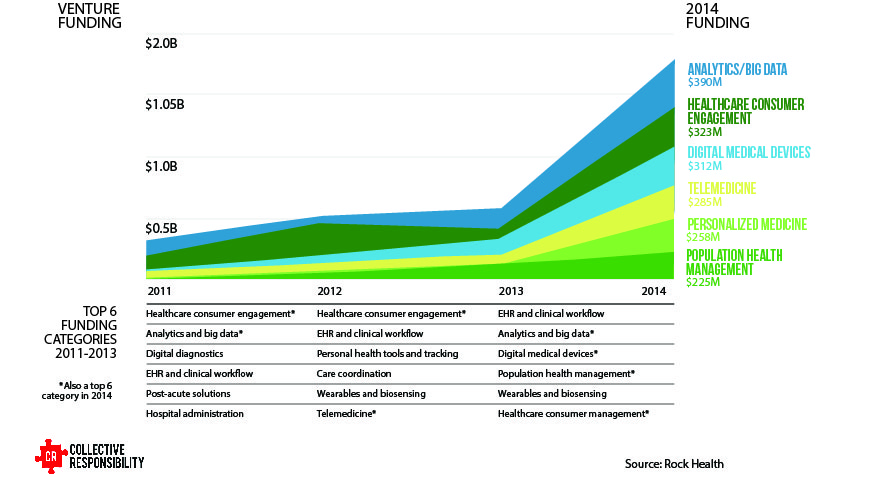
Healthcare
While it has made great strides in improving the quality of life for its 1.5 billion residents, China’s healthcare system has seen increased pressure to meet the size, scale and speed required for the country’s urbanized population. This pressure increases by the day as China’s elderly population grows, and its residents transition into an urban lifestyle that includes higher levels of processed foods and lower activity levels.
To overcome the challenges faced, the government predictably made investments in hospitals, equipment purchases, and in training medical professionals. However there are a number of areas where technology has already proven itself in improving the accessibility, affordability, and quality of healthcare in China . In response to the long-standing problem of vast queues and growing inefficiencies in Chinese hospitals, solutions to cut the time spent at the hospital have grown popular. Guahao, a leading mobile app in this space, connects patients with doctors, allowing users to search for physicians in their geographic location and book appointments.
At the other end of the spectrum is personalized medicine. In response to the lack of trust between patients and doctors, medical tech companies offer a more personalized approach to healthcare where consumers can “shop for doctors”, review their qualifications, and contact them instantly . Tech has also become an important element in preventative medicine and one of the biggest trends these days is wearable medical devices. Once luxury items for sports enthusiasts, for many people wearables are now becoming a part of daily life and may soon present an opportunity to improve quality care at the personal level. Many see this as a crucial area for healthcare, with users able to measure an increasingly wide range of metrics including heart rate, sleep patterns, blood pressure, blood oxygen, and blood sugar. There are already a number of products on the market from Xiaomi, Huawei, Fitbit, and Apple that are growing in popularity and use.
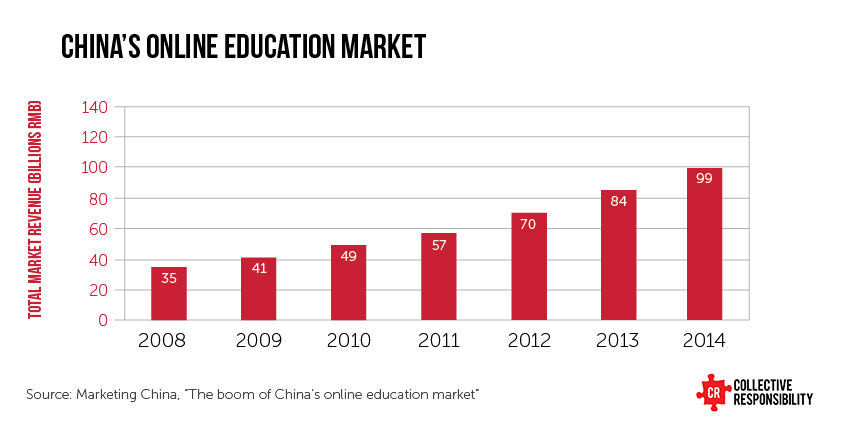
Education
China has a national goal of economic prosperity for 2025, but the country’s rigid education system makes it difficult for students to develop skills required by both domestic and global employers. They are constantly pressured to achieve high standards but have minimal resources to adapt to the rigorous system, paving the way for an unsustainable future in education. There is limited access to quality content and structured English language classes in rural areas, while the gao kao – a high-stakes exam for high school students hoping to get into college – is seen by many as a measure of who is best at rote learning. But there is help available in the form of online tutoring and test prep . These range from simple mobile apps such as Baidu’s Homework Helper and Kuailexue that allow students to crowd-source homework help, to online websites such as Genshuixue and Superclass, which allow students to select courses and teachers to learn interactively.
Then there are online language teachers: although English is taught in school, there are few opportunities for students to practice speaking the language. To fill that gap, startups like italki and mobile apps like CCtalk from Hujiang, are helping students connect with native speakers and teachers. This creates a personalized learning environment for students and gives them real interaction with the language.
Tech rules
Thanks to the development of technological solutions, and through the analytics that will come through the Internet of Things and meta-data analysis, smart products and services are able to tell us more and more about our daily lives. They help us identify areas for cost reductions, create opportunity and improve the uptake of technologies that help drive increased sustainability across a number of systems that will be at the core of managing the development of megacities.
To date, the firms best positioned to bring the solutions needed have been data driven firms like IBM, Alibaba, Apple, and others, who have spent billions of dollars over the last decade building the infrastructure to capture and analyze the data necessary to act on. But for entrepreneurs, this is also proving to be a huge opportunity ; this is particularly true of those looking for answers to tangible problems, and where development of local solutions can be supported. This is already being seen as particularly prevalent in the expanding cities of China and the rest of the developing world where urban populations are growing at the fastest rates. For tech-savvy entrepreneurs, there are myriad opportunities for well-executed planning to develop these cities into modern, sustainable urban centers .
Reframing Sustainability For Future Cities
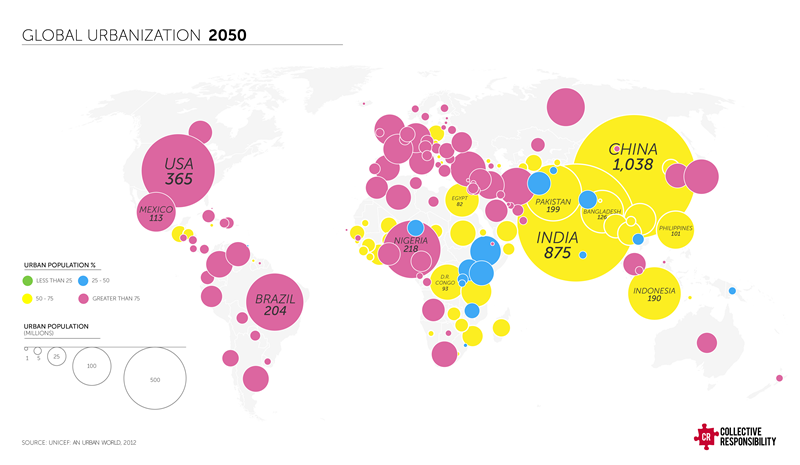 For the first time ever (as of 2012) more people – over 700 million – live in China’s urban areas than in its rural regions. By 2020, about 60% of China’s population will live in cities; and 300 million urban residents are expected to move into its urban centers by 2030. Along with this shift to a more urban population comes a dramatic change in lifestyle: from a subsistence level or an agrarian focus to a consumption-focused lifestyle.
For the first time ever (as of 2012) more people – over 700 million – live in China’s urban areas than in its rural regions. By 2020, about 60% of China’s population will live in cities; and 300 million urban residents are expected to move into its urban centers by 2030. Along with this shift to a more urban population comes a dramatic change in lifestyle: from a subsistence level or an agrarian focus to a consumption-focused lifestyle.
Sustainability in China has been a topic of many conversations for years now. The failure of China and the US to come to agreement in Copenhagen in December 2009 focused even more attention on the topic. It is a story that has been about smoggy skies and polluted skies, and as the challenges have grown, calls for a different model have grown louder. It is a story that has gained more steam over the last several years as urban residents have become more numerous, grown wealthy, and are increasingly impatient with the smog.
On February 28, Chai Jing, one of China’s most famous television journalist and a best-selling author, released a self-financed documentary aiming to unveil the root causes of China’s notoriously polluted air. The 103-minute video quickly went viral, and within days of its release it had been viewed more than 200 million times. Some began calling Ms. Chai China’s Rachel Carson, an American activist whose book The River Runs Black was seen as a turning point in America’s environmental movement. Others compared the video to Al Gore’s An Inconvenient Truth.
For many foreign firms operating in China, this change in dynamic has often been seen as a threat as regulatory bodies and their enforcement arms have increased their efforts to curb pollutants. For others, the changing dynamic has been a source of hope. It’s a sign that China’s new markets for green energies, building materials, and electric vehicles – which are growing faster than anywhere else in the world – are being driven by a wider body of stakeholders that are accepting that China’s environment is failing and that change needs to happen. Change is beginning to take place. A change that, if made, will over the coming decades see the development of sustainable urban environments becoming one of the greatest economic opportunities of our lifetime .
Looking at the issues of sustainability in the context of China today, it is of primary importance for outsiders to understand the following:
- Historically, China’s issues of sustainability were not linked mainly to private consumption, as they are in the United States or Western Europe; they were linked to the industrial processes that are supporting China’s economic development model.
- China does not see emissions as a “problem” that must be dealt with immediately . With economic growth still the priority , the country’s concerns with sustainability are focused on accessing and managing the resources that its cities will need to grow, while reducing the emissions that are contaminating its air, water, and soil.
- The largest pressure China faces to solve sustainability issues will continue to come from within, as the next 25 years of growth will come from another 300 million moving to the city .
Simply put, the issues that China faces are largely tied to economic development , the problems themselves are growing in size and frequency, and China will do what it takes to fix those problems in a way that considers the needs of its people first. These are also issues that will continue to be faced by India, Brazil, Nigeria, and the next generation of cities that will go through hyper-development over the next 25 years. Leaders need to stop seeing sustainability in China as a threat to doing business , and begin seeing it as an opportunity to develop a portfolio of products and services that will support the urban centers supporting billions.
Areas where there are immediate opportunities and need:
- Urban Planning – At the core of a sustainable city is the urban planning, and sustainable cities are often viewed as the only way that a population of 10 billion people on Earth could be sustained. They need to be dense. They need to be efficient with resources. But more importantly they need to be places where people want to live, raise children, and invest in their communities.
- Energy distribution and efficiency – While the focus of many conversations in the energy industry is around cleaner energy supply, for China the real need is to drive efficiency through the grid – a grid that requires up to three times the amount of energy it takes Western markets to create one unit of GDP.
- Food safety – Whether it is through the acquisition of firms like Smithfield Foods, or through partnerships with IMB to create pork traceability programs, one of the key areas for improving the urban economy will be through food . With an estimated 40-60% of China’s food lost before it reaches the tables of its consumers , it is an industry whose inefficiencies begin on the farm and continue through the entire food chain .
- Accessible and affordable healthcare – With China’s population graying, and its urban environments struggling to provide care to its sick and aged, mayors around the country are already looking to industry to bring solutions that build on top of the government’s own capacity to build care facilities .
- Efficient Transportation – As consumer demand for private vehicles continues to rise, a variety of alternatives are being developed to address the challenges. The automotive industry is focusing on broad innovations (including electro-mobility) to decrease fuel consumption and reduce the emissions of public and private vehicles. At the same time, advances in technology and investments in infrastructure have the opportunity to make public transport a more viable, efficient alternative.
- Waste Management – As China’s material consumption continues to increase, the level of waste production will only increase the amount of organic and inorganic waste that is entering landfills every day.
Where this gets exciting for those in China, is that once a product or service’s pilot project has proven itself in China, there will be an opportunity to scale to the country’s needs through the markets of India, Brazil, Indonesia, and Nigeria . These are the cities of the futures for hyper-urbanization, and will be critical players in a world where there are 6 billion urban consumers looking to live the “American Dream”. It’s a dream that is only possible through a new model, one that will be sketched out in China and fine-tuned over the next 35 years.
